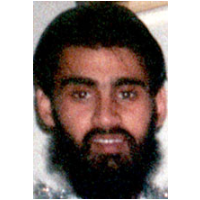Terrorist Conviction Upheld Despite What One Jurist Called “Laughable” Testimony
 Hamid Hayat
Hamid Hayat
The 2006 terrorist conviction of a Stockton-born man was upheld by a divided federal appellate court panel Wednesday although one of the judges called some of the testimony against him “laughable.”
Judge A. Wallace Tashima said Hamid Hayat was being punished for a crime that hadn’t been committed and called the case “a stark demonstration of the unsettling and untoward consequences of the government’s use of anticipatory prosecution as a weapon in the ‘war on terrorism.’ ” The judge said the government’s case was “largely based on dire, but vague, predictions that he might commit unspecified crimes in the future.”
Tashima’s two colleagues, Judges Mary M. Schroeder and Marsha S. Berzon, disagreed and Hayat will continue serving his 24-year sentence in an Arizona federal prison for giving material support to terrorists and lying to the Federal Bureau of Investigation (FBI) about it.
Hayat was first implicated by FBI informant Naseem Khan, nicknamed “Wildcat" by agents, who was recruited after the agency stumbled upon him during a money-laundering investigation in Oregon a month after 9/11. Khan told the bureau that he had seen al-Qaida’s second-highest ranking member, Ayman al-Zawahri, at a mosque in Lodi in 1999.
That later proved to be false. But the FBI sent Khan to Lodi, where he recorded conversations with Hayat, who lived over his parents’ garage and spoke disparagingly of the U.S. and Israel. The 19-year-old fruit packer also talked about aspirations to attend terrorist training camps in Pakistan.
Hayat lived in the U.S. until age 7, but moved to Pakistan where he stayed with his grandparents until he was 18. He came back to the U.S. in 2000, met Khan, returned to Pakistan with his family in 2003 for two years, landed on the no-fly list and was arrested when he came home in 2005. His father, an ice cream truck driver, was also arrested, but charges against him were eventually greatly reduced.
At first, Hayat told FBI agents he had not attended a training camp in Pakistan, then said he had. Agents already knew that Hayat had told Khan on the phone from Pakistan that he couldn’t attend training because the weather was too hot and the camps were closed. Khan, who was paid an estimated $3,000-$4,500 a month as an informant, encouraged him to try harder.
Hayat’s lawyer said he is considering appealing the judicial ruling to the full appellate court.
–Ken Broder
To Learn More:
Divided Appellate Panel Upholds Terrorist Conviction of Lodi's Hamid Hayat (by Sam Stanton, Denny Walsh and Stephen Magagnini, Sacramento Bee)
9th Circuit Upholds Terrorist Conviction (by Annie Youderian, Courthouse News Service)
24-Year Term for Californian in Terrorism Training Case (by Carolyn Marshall, New York Times)
Is the FBI Encouraging Terrorist Plots In Order to Stop Them and Boost Their Success Rate? (by Noel Brinkerhoff, AllGov)
- Top Stories
- Controversies
- Where is the Money Going?
- California and the Nation
- Appointments and Resignations
- Unusual News
- Latest News
- California Forbids U.S. Immigration Agents from Pretending to be Police
- California Lawmakers Urged to Strip “Self-Dealing” Tax Board of Its Duties
- Big Oil’s Grip on California
- Santa Cruz Police See Homeland Security Betrayal in Use of Gang Roundup as Cover for Immigration Raid
- Oil Companies Face Deadline to Stop Polluting California Groundwater





